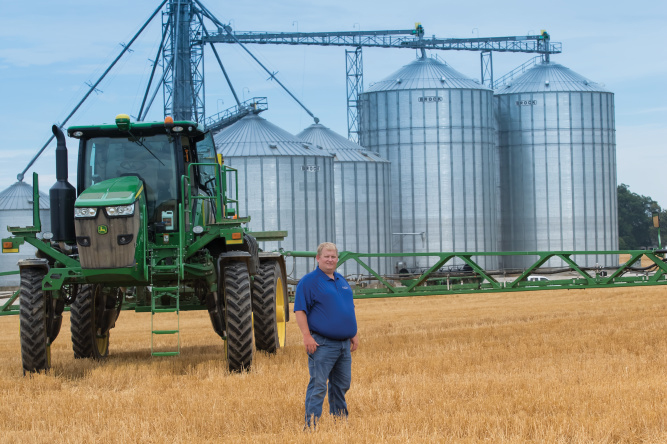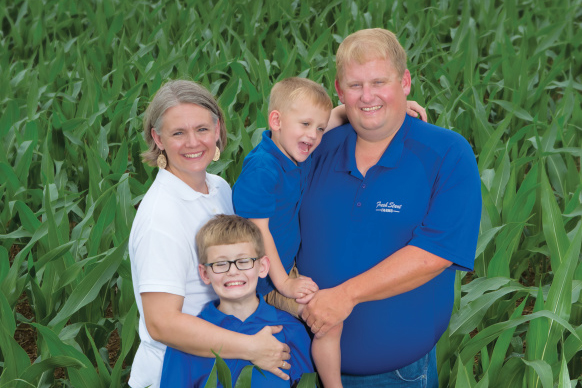Home > Kentucky > Kentucky Farm to Table > Generation Next: Young and Beginning Farmers
Generation Next: Young and Beginning Farmers

As the average age of farmers in Kentucky continues to rise and longtime producers near retirement, the industry depends on new farmers like Ryan and Misty Bivens, owners and operators of Fresh Start Farms, to carry on Kentucky’s rich agricultural tradition.
From Good to Great
The Bivens family moved to Hodgenville in 2002 for Misty’s job as a high school ag teacher and FFA advisor. The couple started a small farm but had no idea how fast it would grow.
“My farm actually started as an FFA project in high school,” Ryan Bivens says. “My wife and I picked up and moved to an area neither one of us was from and started from scratch.”
Today, the first-generation farmers grow nearly 7,000 acres of corn, wheat, and soybeans, though Bivens says their success did not come without challenges.
“It’s just like anything – you always have a learning curve. Your access to capital is a huge issue, and so is land availability. A lot of the land we farm today is ground that was in hay or pasture. We brought it into production. There are safety nets out there like crop insurance, but for a young person starting out that doesn’t have established yields, it’s a big issue,” Bivens says.
Overcoming Challenges
Kentucky Commissioner of Agriculture Ryan Quarles agrees that one of the greatest challenges facing beginning or new farmers is access to capital.
“Farming is a capital-intensive industry, especially if you do not come from a farm family or have the ability to eventually own or rent land. The startup costs are often prohibitive, so we have a loan program specifically geared toward beginning and young farmers,” Quarles says. “Farming has also become increasingly sophisticated. It’s more than just cows, plows and sows. A farmer today must be a master of many trades, including engineering, environmental knowledge, veterinary background and agronomy. It’s important that new farmers are aware of the emerging technology, such as GPS or drone technology, so that they can be successful in a competitive environment.”
Sam Moore, owner of Sam Moore Farms in Morgantown, agrees. Moore, 72, has begun transitioning his farm over to his son. He says technological advances will give his son an advantage he didn’t have when starting out.
“It was difficult for me when I started. I started with virtually nothing because I was really a first-generation full-time farmer,” Moore says. “[My son] is starting out with a good line of equipment, and he’s much more in tune with the technological advantages that there are out there today. We’ve got a GPS system on his tractor now – something that I would have never dreamed of.”

Each One Teach One
Moore says he’s fortunate that his son is willing to take the reins of the farm.
“It’s very important to me because I built my farming operation from scratch, and there’s a certain amount of pride in doing that. I am very pleased that he has never done anything but work on the farm. He loves it and it was a natural fit for him, and I’m glad I’ve been able to [keep the farm in the family],” he says.
Although Bivens did not inherit a family farm, he says a strong network of farmers and mentors within the community has helped the business grow.
“We’ve had several mentors along the way. We’ve had more people willing to help us than people not wanting to help us,” he says. “There have been plenty of hard times, I’ll be the first to tell you that, and it hasn’t been an easy road, but you put your heart into something, and a lot of people appreciate that.”
Quarles says it’s important that the agriculture industry inspires the next generation of agricultural leaders by investing in the state’s youth.
“In Kentucky, we have strong 4-H and FFA youth development programs, and we financially support them because we know that those programs help connect the youth with agriculture. It’s also becoming more and more common that those interested in entering agriculture as a profession do not have a farming background, and we need to be conscious of that and also willing to support anyone who has an interest in farming,” Quarles says. “Millennials must rise to the challenge of feeding the United States and the world, especially as the world becomes even more connected through globalization and international trade. I believe we’re up to the challenge.”



